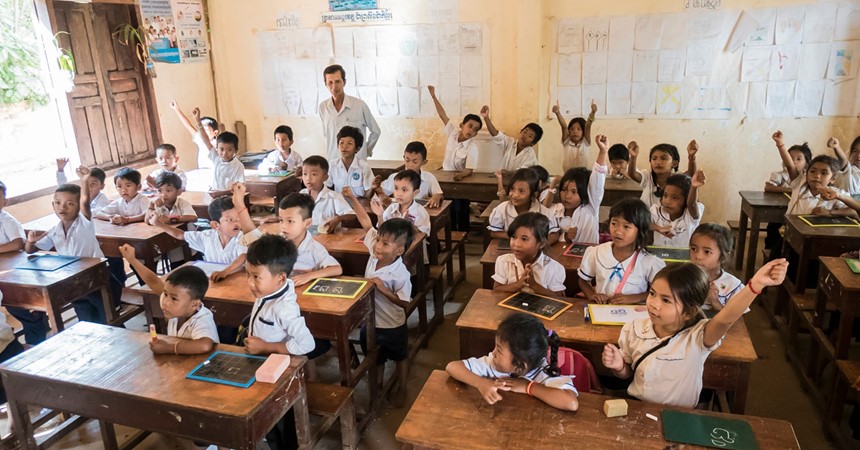The most significant experience in my Jesuit life was a three-month stint in a Cambodian refugee camp in 1984, after the Vietnamese military had driven out Pol Pot but faced resistance from various groups. I had been a priest for about 15 years and had been teaching theology for seven. I was feeling a little discouraged by the apparent roll-back of Vatican II and by my recognition of my limitations.
My stay at the Thai border was a time of discovery both of myself and of ministry. I spent the time teaching English (unskilfully) to Cambodian refugees who worked in hospitals and schools run by overseas volunteer agencies.
The heart of my experience was to move from seeing refugees as a problem or as a group, to know them as persons, as friends, each with their own face, hopes and fears, and many with a resilience and generosity I would have associated with Christian saints. To be with them was a gift, and to stand with them in their struggle to find a life and a home was a matter of decency.
My time at the Cambodian border reshaped my faith, too. I was there during Advent and Christmas, a cooler time when the rice was growing. The Advent Mass readings came alive in fresh ways. Isaiah’s prophecies that God would bring the exiles home to a green and happy homeland were poignant and real when read at sunset in the rice fields. The Gospel stories with their village contexts, too, came alive in the daily life of camp and village. The fragility and the gift of the universal Catholic Church came alive in the simple daily Mass.
I was also blessed by the company of many volunteers who freely gave years of their lives to help the people in the camp. Among us were Evangelical Christians, Buddhists, Muslims, atheists, disillusioned Catholics, all united by a recognising in refugees our brothers and sisters. Instead of judging their religious allegiances from outside, I was able to explore them from within, and was gently prodded to move beyond my sense of Catholic superiority.
At the end of my time in the camp I recognised that, like so many other volunteers, I had come into their lives and would soon leave them. I promised myself that I would be constant.
I returned to the camp in following summers and gave time to Jesuit Refugee Service, then in its beginnings, to advocacy for refugees, to ministry in the Immigration Detention Centre in Melbourne and also to small communities of Cambodian and Laotian Catholics, commitments from which I have drawn life.
That first experience and my continuing contact with people who came to Australia seeking protection from persecution have shaped my subsequent life and ministry. In preaching and teaching theology they led me to focus on the Gospel stories, and particularly on Jesus’ relationship to the people who were locked out of society. He noticed them and made them feel at home and alive. When speaking of the hope that Jesus brought, too, I have always imagined it first as hope for refugees and other homeless people. If the way I or others spoke of Christian hope was not good news for them, I thought, it would not be good news for anyone.
In my relationships with people, I learned – though I have too rarely put the lesson into practice - always to look people in the eyes and not to see them through such labels as Catholic, Indigenous, prisoner, wealthy, addicted, socialist, feminist and so on. We see Christ’s face if we look into the eyes of all the people we meet, and especially of those who are most vulnerable and who share the rejection and suffering he met.
Writing for Catholic and other magazines has become an increasingly important part of my ministry. Through my companionship with refugees I learned that good religious and other writing is not a matter of strong passion, of using academic or theological words or of piling up shoulds and musts. It requires first of all what Ernest Hemingway called a ‘bullshit detector’, recognising when your words do not speak out of your own life or catch the lives of the people about whom you are writing.
The lives of refugees, of people on Manus Island and Nauru, have provided that for me. By measuring government policies, politicians’ words and my own words against the lives of such people, I have found a compass for finding my way in our church and world.
In many ways that public world is a desert: brutal, selfish, self-opinionated and timid. The Church, too, is travel-stained and ashamed. But when we look further we can see blades of grass springing up through the dust: people linked by decency, compassion and righteous anger. They keep speaking truth to power, visiting the imprisoned, feeding and clothing the hungry and relating to refugees as our brothers and sisters. In that is wisdom.



























































































